Public order and its discontents
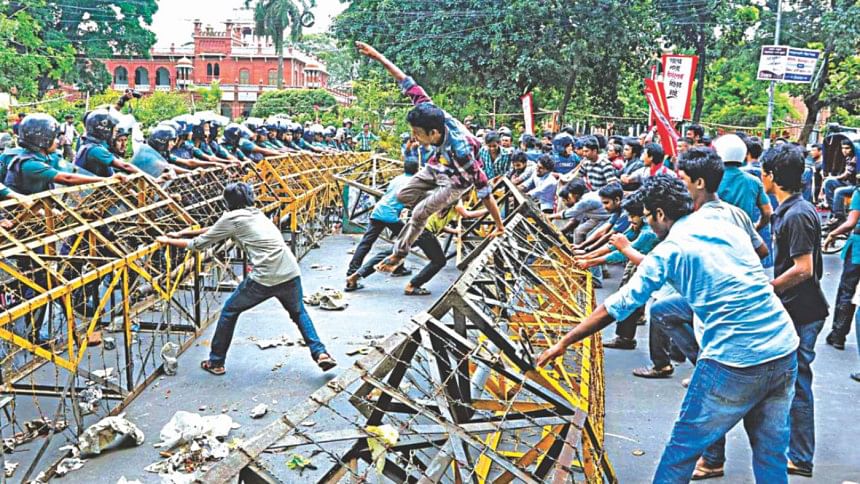
A concerned commentator feels uneasy at the modus operandi of the Dhaka Metropolitan Police in laying down conditions for holding public meetings in connection with the observance of January 5 election in the metropolis. He finds "injudiciousness…..on the part of those that thought it fit to entrust a law enforcing agency to be sole judge in the matter of politics." Interestingly enough, the commentator succinctly adds that when a security agency "remain the sole authority to determine where, when, and how a political party should organise its programme [it] is indicative of the deep malaise in our system."
One, however, could take issue with the observation that as a practice in matters of permitting public meetings the final decision rests on civil administration and not the police. Two questions would arise here, first, whether or not the police is a part of the civil administration and thus an organ of the government and secondly, what impropriety is caused when police as a publicly funded and maintained organisation is performing a legally mandated function. Are we reflecting on the wisdom of the legislature in as much as we may appear to be questioning the desirability of the police in imposing and enforcing a regulatory directive pertaining to matters of public order?
Legally speaking, the right to assemble and participate in public meetings can be restricted only by a law imposed in the interest of public order or public health. Further, the freedom of assembly is not an absolute right and it cannot be construed as a license for illegality or incitement to violence and crime. It is the duty of the government to prevent the obstruction and not to prevent the peaceful assembly. However, the situation may be different in case of an emergency which may necessitate prohibition of the assembly.
In our parlance we often come across events when an act has the potential of disturbing the even tempo of community life. In such a scenario, the interest of the public order is clearly involved. Therefore, if certain activities have a tendency to cause public disorder, as has been the experience in our situation, a law penalising such activities will not be an unreasonable restriction in the interest of public order.The important fact to note is that the connection between the restriction and public order is proximate and direct.
On a broader perspective, we may find that our substantive penal and procedural law empowers the police with wide discretion in respect to preventing offences and maintaining public order. For instance, Section 151 of the Code of Criminal Procedural says that, "A police officer knowing of a design to commit any cognizable offense may arrest, without order from a Magistrate and without a warrant, the person so designing, if it appears to such officer that the commission of the offense cannot be otherwise prevented".
It is interesting to note that in respect of the above law, it would not be possible to investigate the facts in order to ascertain whether in fact a cognizable offence was intended to be committed or not. It is also not open to the High Court to question whether in fact the police officer was justified in concluding that the necessity contemplated by the law really existed. The discretion is vested solely in the police officer and that discretion cannot be questioned in a proceeding.
The point to note is that, in addition to other laws, the Dhaka Metropolitan Police ordinance (Section 26 to 30) confers wide regulatory and prohibitive powers relating to assembly, meeting, and movement. Therefore, we may need to examine whether law enforcement agencies should continue to have wide and sweeping powers that carry the risk of curtailing civil liberty. We also need to see how we can harmonise the maintenance of public order with the preservation of core fundamental human rights. Understandably, it is an untenable situation when we find spokespersons of the government saying that in respect to prohibitory actions on public meetings, the police will decide and they have no say in the matter. Quite clearly, the police are an integral part of the government and the police hierarchy is subordinate to the political executive.
Under the circumstances, we may have to wait for political enlightenment to dawn to ensure democratically desirable public order management. Surely, there should not be any reservation about foregoing enforcement efficiency for protecting and maintaining civil liberty despite the fact that public meetings and processions, of late, have mostly come to mean unbearable public inconvenience. The worried optimists have to keep their fingers crossed.
Admittedly, we still have an inherited colonial structure in facing the law and order challenge of a post-colonial democratic society. The modern Bangladeshi State is the product of a freedom struggle that has adopted a written, liberal, democratic constitution but retained the colonial administrative, police and judicial structures without recasting them to meet the altered situation. Perhaps the governing elite of our decolonised society has decided to retain the inherited organisation ignoring justified demands for change.
One may wonder if our political guardians are enamoured by the administrative system left behind by the colonial power. The thought may also cross one's mind if they shall continue enjoying and exercising power and authority,being oblivious of the demand for far-reaching reforms.
The writer is a columnist of The Daily Star.

 For all latest news, follow The Daily Star's Google News channel.
For all latest news, follow The Daily Star's Google News channel. 

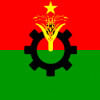

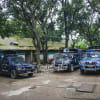

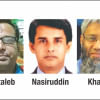

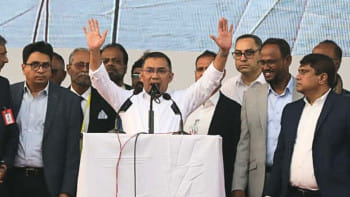
Comments